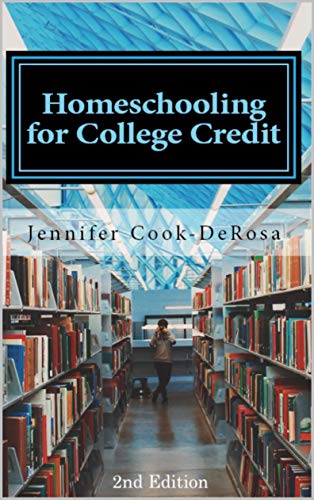The second edition of Homeschooling for College Credit, published in 2018, explores all of the options available for acquiring college credits in non-traditional ways. Dramatic changes have occurred in this arena over the past decade, and this book presents the latest information. While it is not written specifically for Christians, it does include occasional information helpful to them such as information about two Christian colleges with specific plans for high schoolers to obtain an associate degree by the end of high school (p. 189).
As author Jennifer Cook-DeRosa says, her goal is primarily to help homeschooling teens accelerate their education and earn college credits while still in high school, often at a lower cost than traditional college. Her goals are efficiency and cost savings rather than preparing students for admission into an Ivy League university. As she points out, other people concentrate on that niche.
This book is amazingly thorough. The first chapter lays the groundwork for parents guiding their teens, explaining basics such as the difference between a diploma and a degree, the concept of "potential" college credits, and whether or not students need to take ACT or SAT exams.
The second chapter, “Thirty Ways to Earn College Credit,” offers a dizzying array of opportunities to acquire college credit. Cook-DeRosa rates these as to their transferability so that you can identify strategies for obtaining credits most likely to be accepted by a degree-granting institution. She carefully explains why some of the options with limited or improbable transferability might still make the most sense for some students. Cook-DeRosa has used many of these options herself on her path to acquiring four degrees. She has also used them with her sons and has shared them with many others both through her book and through the Homeschooling for College Credit Facebook community that she founded.
As she explains, these strategies are most applicable for earning credits at the 100 and 200 levels (first two years of college). It is important to note that students will generally find that upper-level credits cost more and might be more challenging to acquire than lower-level credits.
In the third chapter, “Behind the Scenes,” Cook-DeRosa gets into requirements that can trip up students attempting to apply credits earned via non-traditional paths toward a degree. There are many obscure rules, regulations, and bits of information that parents and students should know. She goes into detail about accreditation and when and how it matters. She discusses the various types of associate degrees and why credits earned toward some of them might not transfer. She also addresses other issues that can catch parents by surprise. For example, when high school students take college courses through dual enrollment, they are treated like college-age students. Parents have no access to their information and cannot communicate about them with college officials because of the Family Educational Rights and Privacy Act (FERPA) that was written to protect the privacy of students. However, Cook-DeRosa tells us that parents and teens together can request a FERPA waiver so that parents can do things such as getting in touch with an advisor if problems arise for their teen.
The eighth chapter, “Homeschool Exit Strategies,” might be worth reading early on since the wider range of options for life and career prep it discusses might not include college.
Four chapters of the book primarily address topics that apply to homeschooling teens in high school. Among these topics are high school planning, curriculum selection, transcripts, record keeping, and colleges that offer completely free tuition. However, these topics chapters are also expanded with information for the student taking a non-traditional path to earn a college degree.
Since the options for alternate pathways to earn college degrees continue to expand, this book is a valuable resource for understanding the current situation. In addition, the breadth and practicality of the information in Homeschooling for College Credit makes this book more useful than others I’ve seen on the topic. The thoroughness is clearly the result of Cook-DeRosa’s personal experience as well as the feedback she’s gotten from the many homeschooling families who have joined their state-specific Homeschooling for College Credit Facebook discussion group.









